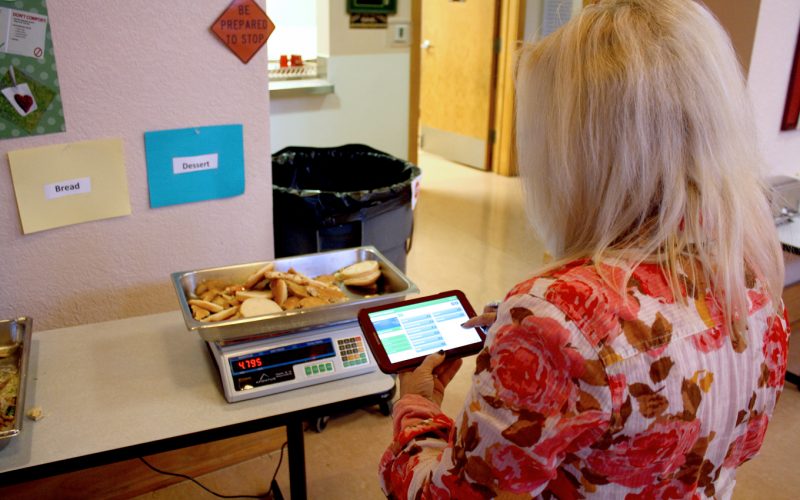
Staff Photo Nick Brothers Cayla Wilson, the Fayetteville Senior Activity Center director, uses a tablet to record the amount of food left uneaten from the free lunch given to seniors.
In an effort to reduce senior hunger in Arkansas, the Fayetteville Senior Recreation and Activities Center is partnering up with a national foundation to help optimize its food resources and programs and reduce food waste.
The What a Waste initiative will track, measure and eventually reduce the amount of food waste generated at the center as well as help optimize its services, said Heather Cosson, director of communications for the National Foundation to End Senior Hunger.
Seniors are defined as citizens older than 60. Nationally, 15.5 percent of seniors face food insecurity and Arkansas was the highest on that list at 26 percent, or 1 in 4, according to data from a 2013 Census study by the National Foundation to End Senior Hunger.
“Eventually, the Fayetteville Senior Center will reach a limit with what they can provide on their budget,” said Angie Dunlap, community programs director for the Area Agency on Aging in Northwest Arkansas. “We’re not quite there yet as far as home delivered meals go, but we’re talking about a handful more of people that can be added before starting a waiting list.”
Another important fact, about 40 percent of food is wasted or uneaten in the U.S., according to research by the Natural Resources Defense Council.
After receiving a sizable grant from Walmart, the Washington D.C. based non-profit came with a plan to collaborate with the City of Fayetteville to pilot the new waste program.
To track the waste, senior center staff use a specially developed app on a tablet computer that estimates the amount of money lost from each measurement. The app is used to keep track of prep waste for expired and kitchen errors, pan waste to measure if enough of the food offered is being eaten and plate waste to see what isn’t being eaten. After each meal, staff members place the pans of uneaten food on a scale and follow a series of prompts for data entry.
“There are nutrition requirements for each meal. The meals are planned for the seniors to eat those, but if the seniors aren’t eating the food, then that doesn’t do them any good,” Cosson said. “We’re learning which foods the seniors like and which they don’t like so the senior centers can prepare meals and menus that match what the seniors need as well as what they’re going to eat.”
Once the food waste is calculated, the data is sent back to the organization. After four months, analysts plan to compile the data into a preliminary report to recommend implementing new methods and policies to increase food efficiency. After a month of tracking the new procedures, new data will be compiled to track the potential success. The entire process will last a year, Cosson said.
After tracking and recording the food waste, instead of throwing it out, the waste will be composted through a new pilot project with the City of Fayetteville. Once spring 2016 arrives, the composted soils will be used to grow fruits and vegetables for the senior center’s meal plans.
The Fayetteville Senior Center serves about 300 meals through its congregate lunch and meals on wheels programs each day Monday through Friday, plus a weekend meal for meals on wheels. Following the recommended daily intake for seniors, each meal is planned to be about 600 calories. Each meal features portions of each food group.
“It’s the health nutrition that really drives this,” Cosson said. “We have a research report that is the health consequences of senior hunger. When seniors don’t receive the nutrients they need, they’re more likely to have heart attacks, asthma or depression. It affects all of your body. We want to prevent that. These senior centers, what they’re doing is so important and vital to the community. We want to help them do a better job.”
At the end of the first year, the goal is to increase the amount of seniors being fed without increasing the budget while reducing the amount of money being spent on food. Once the gardening is implemented, the plan is to introduce more fresh produce into the meals.
“I think it is a wonderful opportunity to actually see what food is being wasted and see the seniors likes and dislikes so we can replace it with something they will eat,” said Cayla Wilson, director of the Fayetteville Senior Center. “I think it’s a huge opportunity to gain knowledge from the program to better serve our seniors’ nutritional health.”
The What a Waste program in Fayetteville is the first in the U.S., and will serve as a model for future waste programs by the National Foundation to End Senior Hunger.



